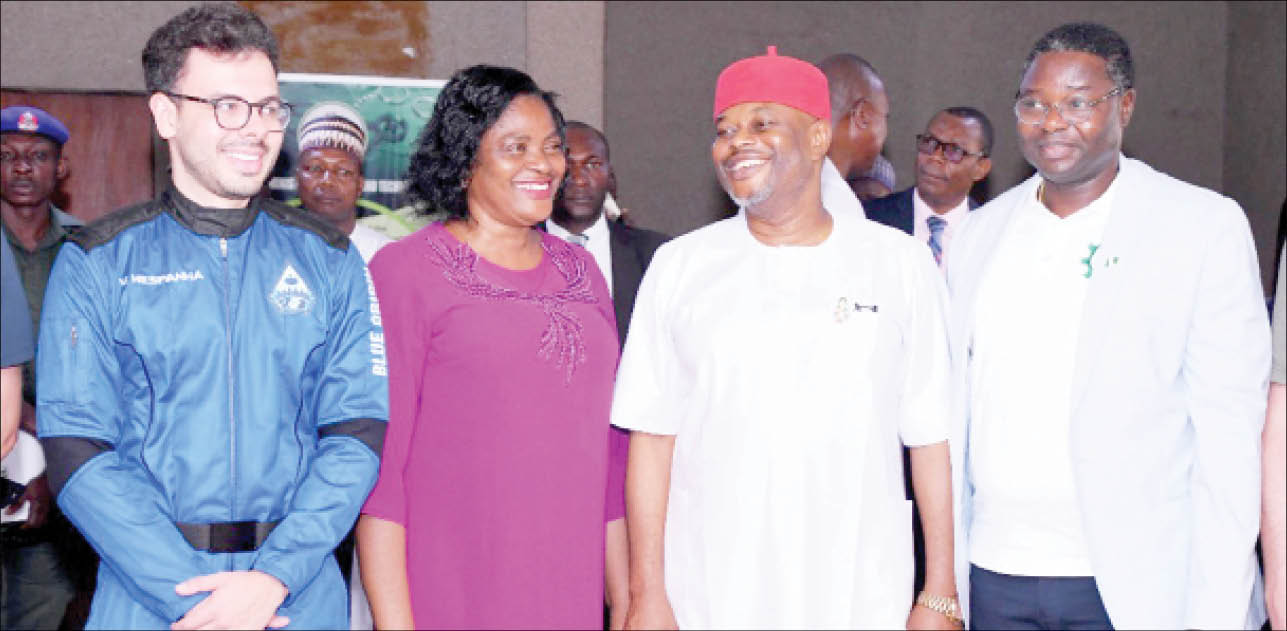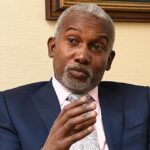Two weeks ago, the federal government and the Space Exploration and Research Agency (SERA), a global space agency based in the United States of America, signed a memorandum of understanding (MoU) on human space flight missions. SERA is a non-profit organization with an initiative to “increase flight for citizens of countries with little or no space footprint.”
SERA will be embarking on the tour with any chosen Nigerian in collaboration with Blue Origin, Jeff Bezos’ space exploration company
According to the report by Semafor, the next space mission of SERA will fly six people to space on the upcoming Blue Origin Shephard flight and Nigeria has a guaranteed slot.
The Blue Origin New Shepard space vessel is a pressurised and spacious crew capsule with room for six people and it’s environmentally controlled for comfort. The vessel is also fully astronomus. There are no pilots.
- Executive order: NAFDAC hails Tinubu on move for drug, health security
- Vigilante, one other killed as argument at viewing centre turned soar
SERA founders, Sam Hutchison and Joshua Skurla stated, “The Nigerian that will be picked to visit the Space will be based on a public voting process. The individual has to be healthy and can speak basic English language. Any individual is allowed to vote for themselves and will canvass votes from the public to increase their chances.
“The votes will be verified using a blockchain system to ensure a fair selection process.”
Space experts said the initiative might stimulate interest and investment in scientific research, technology development, and education on space programs, potentially leading to advancements in space technology within Nigeria.
Also, they added, it will enable Nigeria to achieve the major objective of the nation’s Space Program which is sending humans to space.
Space exploration offers numerous benefits, including the development of new technologies through a series of scientific experiments and the provision of valuable information about Earth’s atmosphere, according Muritadha Ajana, an engineer.
But part of space exploration is the launch of satellites into space – natural or artificial for various purposes such as weather forecasting, disaster management, environmental monitoring, and global communication.
The World Population Review said there are 79 countries with space programmes, but only 22 has the capacity to launch satellites. Currently, 53 countries, including Nigeria, have satellites launched into orbit. In Africa, there are only nine countries with space programs and only four have launched satellites.
In 2022, SERA sent a Brazilian engineer to space, but none of the African countries is yet to have a person sent to space
The significance of this collaboration, which is coming to the country, has been highlighted by the Director General of Nigeria’s National Space Research and Development Agency (NASDRA), Mathew Adepoju, as marking a significant milestone in Nigeria’s 25th anniversary of the Space Exploration journey and opening new opportunities for scientific research and technological advancement.
This bold initiative, such as a manned mission, will inspire space exploration and development across the continent, Adepoju added. The minister of innovation, science, and technology, Uche Nnaji, said the partnership was important to transforming Nigeria’s space programme.
Nnaji said the partnership is a testament to Nigeria’s commitment to advancing its capabilities in space exploration, adding that the public-private partnership (PPP) with SERA would inspire a new generation of scientists and engineers.
Joshua Skurla, the co-founder of SERA, said the agency is honoured to partner with NASRDA, noting that Nigeria has a rich history of scientific and technological innovation.
“Until now, space has been an exclusive domain, with over 80% of all astronauts to date coming from just three countries,” Skurla said.
“Nigeria has a rich history of scientific and technological innovation, and we are honoured to partner with NASRDA to extend this legacy into space and create new opportunities for Nigerian space explorers”, Skurla added.
However, Prof Haruna Ciroma, an expert said sending civilian to space can be view from two perspective, research purpose and tourism.
Haruna said a civilian can be aboard spacecraft to control experiment, conduct data analysis, collect data, etc. But he said in the case of Nigeria, it is not clear why the NASRDA is sending civilian to space and how it will benefits Nigeria economy and telecom sector.
“ Or NASRDA just following the trend because America and recently China sent civilian to space. There is a company in America that mainly shuttle civilian to space, any civilian interested should consult the company for space shuttle not from tax payers money. The benefit of sending civilian to space by NASRDA is more to the country owning the space station because Nigeria will pay them huge amounts of dollars. As a result, add more pressure to our struggling naira. I believe Nigeria is not yet ripe for such a mission because of the lack of space infrastructure to launch the spaceshuttle from Nigeria. In addition, the current economy situation where Nigeria keep borrowing, high inflation rate, hunger and high rate of abject poverty doesn’t warrant such a mission. If you look at those countries involved in spaceflight shuttle,..they didn’t do it at their struggling days until the time they wipe out abject poverty and put basic infrastructure working 24hours such as electricity, water, etc”, he said.
Haruna added that NASRDA should focus on building space infrastructure in Nigeria with capacity to launch satellites and spacecraft shuttle. This, he said, will generate employment and revenue via launching satellite for other countries and companies instead of Nigeria paying to other countries.
But Nnaji said the National Space Policy and Program (NSPP) approved by the Federal Executive Council (FEC) in 2001 identifies human space flight as one of its three pillars according to the 25-year Road map approved in 2005 for the implementation of the National Space Policy and Programme (NSPP). The minister added that Nigeria’s first human space flight was scheduled for 2018, “this means we are six years behind schedule’.’
The Minister stated this, during the Signing of Memorandum of Understanding (MoU) between the National Space Research and Development Agency (NASRDA) and the Space Exploration and Research Agency (SERA) in Abuja.
He further said that the National Space Research and Development Agency was established on 5th May, 1999 with a broad objective to pursue the development of space science and technology for economic benefit of the country.
Nnaji pointed out that in an effort to correct past delays and align with the Renewed Hope Agenda of President Bola Ahmed Tinubu, the Ministry and its agencies have been revatalised to move the country from resource to knowledge based economy, adding that the signing of the MoU is a testament to the Ministry’s rigorous efforts towards the technological advancement of the country.
To this end, the Minister commended the contributions made by Private Sector towards the socio-economic development of the nation, adding that Nigeria is our country and together we can achieve our aspirations without compromising our international reputation.
Speaking, the Permanent Secretary, Mrs. Esuabana Nko Asanye commended the Space Exploration and Research Agency (SERA) for its timely intervention, stressing that Nigeria has been eager to explore space eco-system but have not realized such dream, noting that with the signing of the MoU, the country will be able to achieve the awaited space exploration dream.
Adepoju said NASRDA had successfully launched six satellite missions since inception with the collaboration of international partners.
Nigeria founded its National Space Research and Development Agency in May 1999 and launched its first satellite in 2003, the NigeriaSat-1 for Disaster monitoring.
Currently, Nigeria has successfully launched 6 satellites.
But the immediate former DG of NASRDA, Dr Halilu Shaba, director-general had said Nigeria’s satellite is outdated, but only functioning by ”grace”.
Nigeria has been hit by kidnapping, banditry, communal clashes, attacks on government facilities, and killings.
Despite efforts by security agencies to control the situation, the insecurity go on unabated.
Speaking on satellite operations and national security in an interview on a Channels Television’s programme when he was the DG, Shaba said Nigeria has only one satellite and that it is not enough to serve the country.
He said the satellite was installed in 2011 and should have been changed because it has a seven-year life span.
“We have only one satellite (built in 2011). It has a seven-year life span and the life span is supposed to have expired in 2018. In our culture of satellite industries, you build a new satellite that is supposed to have replaced that one before you; we have not done that,” Shaba said.
He added: “We are living on grace because normally based on the fuel of the satellite, you imagine that it is going to last for seven years but since 2018, the satellite has been functional and it is still giving us the necessary data.”
Shaba said though having more than one satellites and changing the old one is a priority, the country’s dwindling resources have made it difficult to achieve that.

 Join Daily Trust WhatsApp Community For Quick Access To News and Happenings Around You.
Join Daily Trust WhatsApp Community For Quick Access To News and Happenings Around You.


